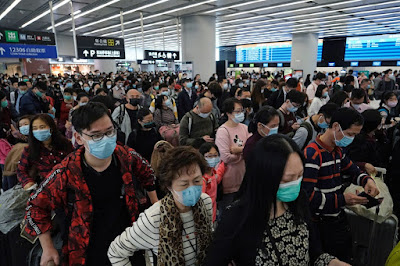The Wuhan coronavirus (COVID-19) is not under control, yet.
But the number of reported cases at the epicenter in China is falling.
President Trump is probably correct on this one:
That said, here is a commentary, by George Mason University professor Tyler Cowen on global supply chains, that helps to understanding what a worst-case scenario, where the globe is lit up by COVID-19, would look like:The Coronavirus is very much under control in the USA. We are in contact with everyone and all relevant countries. CDC & World Health have been working hard and very smart. Stock Market starting to look very good to me!— Donald J. Trump (@realDonaldTrump) February 24, 2020
The global supply chain, already under pressure from President Donald Trump’s trade war, now faces further strain from the coronavirus. And while cross-national supply chains are more robust than they may appear, if they fail they will do so suddenly and without much warning...In the EPJ Daily Alert, I am reporting that, at the margins, some supply chain problems are already developing. I am reporting in the ALERT that some Oakland shipping terminals operators are not accepting cargo ships from China. In addition, of course, much manufacturing in China and cargo loading in China has been stopped or slowed.
Supply chains are not indestructible. If the new costs or risks are high enough, the entire structure will be dismantled. By their nature, supply chains do not fall apart slowly, because each part of the chain relies upon other parts to add its value. It does not help much to have the circuit components of the iPhone lined up, for instance, if you cannot also produce the glass screens. In this way, these supply chains are less robust under extreme conditions.
Global supply chains have yet to come apart mostly because trade and prosperity generally have been rising. But now, for the first time since World War II, the global economy faces the possibility of a true decoupling of many trade connections.
It is not sufficiently well understood how rapid that process could be...
The nature of the cross-national supply chain makes it especially vulnerable to shocks coming from the coronavirus. These supply chains do not adapt so well to complete cutoffs in materials or labor, as may happen if Chinese coronavirus casualties continue and workplaces find it hard to operate effectively.
Imagine that closed Chinese factories cannot produce the components of many American medicines. It is not a question of the supply chain simply losing some profits; rather, some critical pieces of the production process are missing. The medicines won’t work without these inputs. The U.S. medical establishment might try to source those components elsewhere, but it isn’t easy for other suppliers to produce enough of them at sufficient scale and quality.
U.S. medical producers might try to bid more for the Chinese medicine components, but if the workers are prohibited from even showing up at the factory, no feasible market clearing price can make this arrangement work. Production just won’t be possible. Fashionable practices of near-zero inventories can make these shortages appear all the more rapidly. About 80% of the active pharmaceutical ingredients in U.S. medicines rely on Chinese or Indian components, so this does represent a very real public health risk for the U.S., even if the coronavirus itself does not...
So far the best bet is that current international supply chains will hold, for the most part, and deliver the goods. But the chance that they will not is rising sharply, as both the trade war and the coronavirus strengthen the hand of those who advocate for more dismantling of international trade networks. And if that dismantling does occur, it is likely to snap into place suddenly — with neither market prices nor advance warning offering much protection.
In the ALERT, I liken the situation, though it is likely short-term, to that of a kind-of anti-productivity environment.
Productivity gains out of China have played a significant role in keeping price inflation under control in the US. Supply chain disruptions will act in an anti-productivity manner to put upward pressure on prices.
-RW


This is chicken little "the sky is falling" babble. The only cogent statement Cowen makes is "...It is not sufficiently well understood..." when referring to the international supply chain process. He then negates this statement by asserting that "...supply chains do not adapt so well..." How in the world would he or anyone know this? Its like saying price seeking activity in a free market does not adapt so well. And if it breaks down it will be sudden and without warning. He is stuck in the 1930's just like his Keynesian economic theories.
ReplyDelete